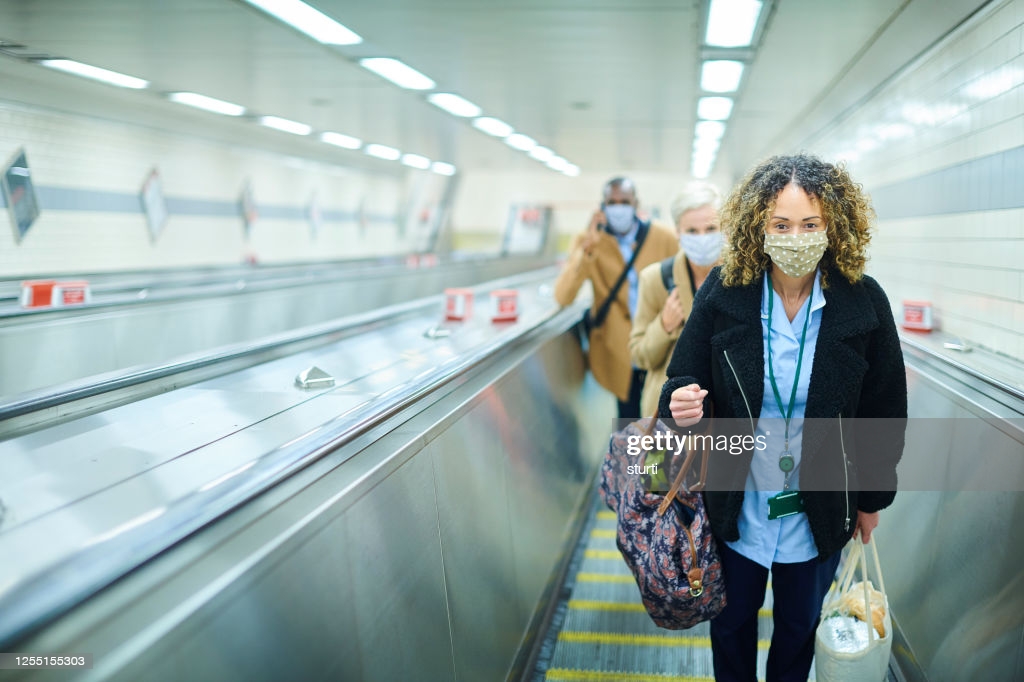Will the UK be quicker than most to return to economic normality?
On July 19, 2021, the UK plans to end some of the key remaining restrictions like social distancing and mask wearing.

A female commuter on her way to work by underground wearing a face mask
The assumption is clearly that the rollout of vaccines for coronavirus will slowly return societies and economic activity to something like normal as personal freedoms are restored. But is this likely; or is it really a case of two cheers for freedom, not three?
In this regard, the Standard Bank thinks that the UK may be the proverbial canary in the coalmine. Its vaccine rollout has been about the fastest of most countries. Almost 50% of the UK has received full vaccination; only Israel, Bahrain and Mongolia are ahead. In contrast, those still far back are either countries that have had lower incidence of coronavirus, like Australia (where the vaccination rate is just over 6%), or countries in the developing world like Brazil (13.2%) or South Africa (0.8%).
Understandably, perhaps, the UK has been quicker than most to ease coronavirus-related restrictions and, on July 19th plans to end some of the key remaining restrictions like social distancing and mask wearing. This all might sound pretty positive for the UK economy and its financial assets such as GBP and equities, but it is not as simple as this. For a start, when restrictions ease, case numbers rise and this can make the population somewhat wary of the new freedoms.
For instance, the UK now has around 370 cases of coronavirus. This is a ten-fold increase over the past two months. It might be far short of the near-900 peak that we saw in January but sharply rising case numbers can still impinge on the return to economic and social normality. If we take mask-wearing, for instance, the UK government has said that it is no longer a legal requirement to wear masks in certain environments. Instead it is a matter of ‘personal responsibility’. However, masks offer protection to others, not necessarily the mask wearer. So, mask wearing is more about societal responsibility, not personal responsibility.
Many that might have felt comfortable entering into certain activities in the past where masks were compulsory, might refrain in the future if they fear that others won’t live up to their societal responsibility by shunning mask wearing. This might only seem an issue for a small proportion of society; perhaps those medically more at risk from coronavirus infection for instance. However, opinion polls pretty much all the way through this pandemic have shown that the public is generally more cautious than the government when it comes to easing restrictions, and mask wearing is no different. This is important because the way in which individuals generally behave is down to their own instincts more so than the instructions of government. If that continues to be the case going forward the government may find that the lift to growth from the reopening of the economy falls short of what it is seeking. This is compounded if the government ends up being proved wrong, as it was last year when a re-opening of many sectors in June had to be reversed again by October. Today the government’s mantra is for an ‘irreversible’ easing of restrictions and there’s no doubt that vaccines could allow this because the link has been broken between high case numbers on one side and hospitalisations and deaths on the other. But new variants may still test this link.
Nobody envies the UK government, or any other government, in the choices that they have had to make, and will continue to make when it comes to coronavirus. Economic growth is, and will, snap back strongly simply because opportunities re-open, for travel, theatre visits and more. But will as many take advantage of these opportunities if they fear that the restrictions are being lifted too fast? If the answer is ‘no’ because people are still scared, the rebound will fall short of expectations and UK asset prices might start to fall short. Hence, the Standard Bank thinks it is a case of two cheers for freedom, not three.








